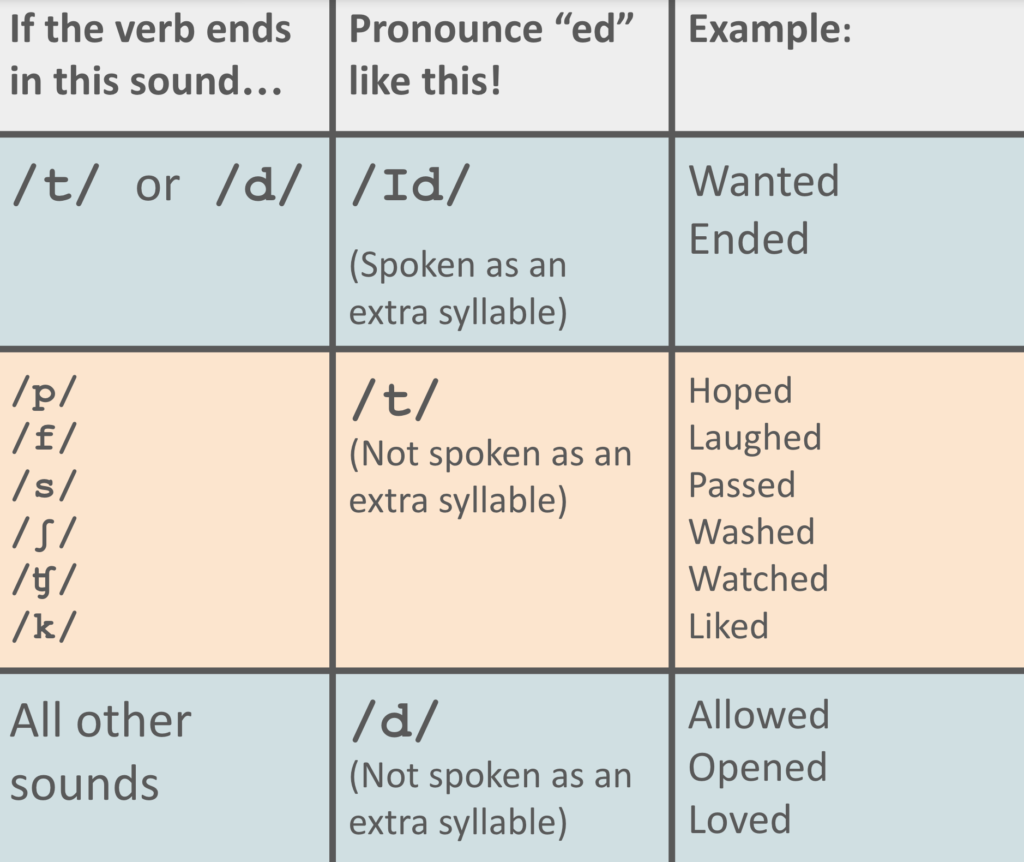If you listen carefully to a native speaker say a word like “worked,” you might notice something strange. It doesn’t sound like they say the “ed” at the end of the word at all— it sounds more like a “t” sound that’s just hanging on the end of the word. The confusion continues when you hear them say “cleaned” and notice that the “ed” sounds like a “d.”
Then, they completely fry your brain when they say “painted,” which not only sounds exactly like “ed” looks, but pronounces it as an extra syllable. Most of the time, the speaker doesn’t even know why they pronounce “worked” differently than “painted”— but they do it every time, without fail.
Incredibly enough, I had never even thought about this phenomenon before some of my students pointed this out to me and asked, “what’s going on?” Of course, I had noticed that Brazilians had a tendency to say the “ed” sound at the end of past tense verbs as an extra syllable, but I’d never given it much thought. After doing a little research, I learned that there was quite a bit more to the pronunciation of these two little letters than met the eye!
Just A Spoonful of Linguistics Makes the Pronunciation Make Sense
Unvoiced and voiced consonants are the reason why the pronunciation of “-ed” at the end of a past tense verb can change. Quite simply, the last sound that the verb ends with decides what pronunciation of “ed” you’ll use.
There are three ways to pronounce the “ed” at the end of a regular past tense verb, and they are:
/Id/, like the “id” sound in kid,
/t/, like the “t” sound in time,
/d/, like the “d” sound in drive.
Now that you have the basic idea, check out this chart:

Keep in mind that it’s the sound that matters, not the letter. That’s why the verb “laughed” is grouped with the unvoiced verbs, because the “gh” makes an “f” sound.
Putting It Into Practice
Several common past-tense verbs are affected by these pronunciation quirks. Here are a few:
Common Past Tense Business English Verbs That Pronounce “Ed” as /Id/:
- Ended
- Posted
- Started
- Updated
- Visited
Common Past Tense Business English Verbs That Pronounce “Ed” as /t/:
- Liked
- Linked
- Stopped
- Talked
- Typed
- Watched
Common Past Tense Business English Verbs That Pronounce “Ed” as /d/:
- Allowed
- Applied
- Cleaned
- Learned
- Loved
- Opened
- Shared
- Stayed
Of course, there are a lot more verbs in these three categories. But don’t stress— the more you practice, the more you’ll start to notice the linguistic similarities of verbs in these three categories and naturally begin to anticipate the way the “ed” will be pronounced in a given verb, without having to think about it. Just like native speakers do!
So, Why Does This Matter?
When speaking English as a second language, it’s important to remember that people are usually accepting of minor errors like pronouncing the “ed” sound in “cleaned” as an extra syllable. People expect a Brazilian speaker of English to have an accent— in fact, it would be sort of strange if they didn’t! However, in a job interview or in an important meeting with an English-speaking client, it’s important that you be as clear as possible. In these cases, even minor errors can make a big impact on your ability to be understood, and can be a big source of anxiety.
That’s where our advanced business English pronunciation exercises come in. At Verbalize Now, we take the time to identify the common pronunciation challenges that our students face and give them strategies to overcome them. Most importantly, good pronunciation can help you build the confidence you need to transform your life by getting a better job at an English-speaking company.










